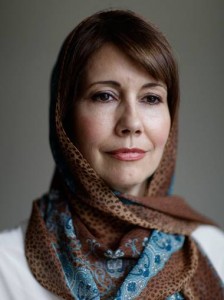Look at pictures of real live white women wearing hijab!
All the exclamation marks in existence could not hide that these are the usual soundbites in a story that gets repeated more often then Home Alone at Christmastime. The problem with these statements being that not only do they erase the experiences of convert from other ethnicities, they also have a “A white person choosing to be Muslim, the horror!” undertone to them.

So while these statements are linked to the publication of a new study “A Minority within A Minority”, which claims to be the UK’s biggest study on converts to Islam, there is nothing new about The Independent‘s framing of it, which, while better than most, still chooses a picture of a white woman wearing hijab as the largest, most prominent image. (Note: I read the article in print form.)
The article talks briefly about the study finding that converts can feel isolated both from their communities of origin and the Muslim community, which is true, but not exactly news. However, there then comes the finger wagging about other religions being better towards converts: “While other major religions have established programmes for guiding new believers through the rigours of their faith, Islam still lacks any such network, especially outside the Muslim hubs of major cities,” to which one wonders, really? Certainly, other religions may have more structured pre-conversion/teaching programmes, but ultimately new converts are still reliant on community support. There also the fact of Islam not being a centralised network type of religion, despite the media thinking otherwise.
Also mentioned is converts finding more in common with other converts, yet while the study is described as Leicester-based, the article fails to mention that it was probably using the New Muslim Project ( a UK-wide convert organisation providing support and social activities for Muslims, which is based in Leicester) to seek respondents, so the sample group are going to be people who actively socialise with other converts anyway.
More interesting than the article were the interviews, and it here the The Independent deserves credit for providing a wider variety of viewpoints then usual. The biggest photograph went to Kristiane Backer, someone who is a fairly high profile convert. Another woman profiled, Amy Sall, converted after marrying her husband, and discussed problems that echoed the study’s findings: namely finding the mosque intimidating and receiving abuse from a non-Muslim when wearing hijab. She also mentioned the differences in religious practice between her and her husband, and the arguments this can cause.
However, the next two interviewees are perspectives not often heard in pieces about converts. Donna Tunkara is a mixed-race convert and talks of not being seen as British and it taking time to regain an identity she feels comfortable with. She also states that mosques need to be more accessible, especially when it comes to providing religious education. Obviously space is limited, but I really would have like to here more about how she regained her identity and what helped her to do this.
Finally, Nicola Penty-Alvarez is a convert who has since left Islam. She describes it as a sudden sensation that things weren’t right for her. While her leaving Islam led to the break up of her marriage to a fellow convert, they are now on amicable terms. She does not regret her time spent has a Muslim, saying that a lot what she learnt spiritually she has kept. What makes this final interview so intriguing is that ex-Muslims are rarely mentioned. Either their existence is ignored or the ex-Muslims who do speak out will describe Islam and being Muslim in very negative terms. Penty-Alvarez’s experience is an interesting contrast to this.
In summary, I feel it’s important to clarify that I don’t necessarily disagree with the study’s findings. Converts are often poorly treated by Muslims and non-Muslims alike. I could sit here, shining the metaphorical torch under my face and tell many horror stories about such poor treatment. However, my frustration with the UK media’s preferences with the same tired narratives remains. It is still rare to read an interview with a non-White convert, and I think I’ve never read a convert with disabilities being interviewed in this type of piece. The truth is heard when everybody speaks and to hear the truth about being a convert to Islam, you need to speak to more then one type of convert.











